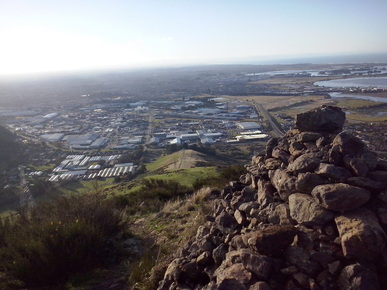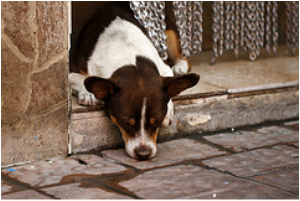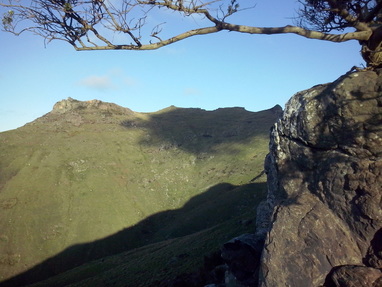 This post isn't about some new idea in psychotherapy or counselling, or about the psychology of the social or environmental issues we collectively face. It's about the afternoon that I spent yesterday taking some of my own medicine - a dose of ecotherapy. The first thing I want to say is that it's so strange, that it takes getting a bit sick and run down and feeling like I have to stop running in the rat race, to actually give myself something different. Weaving through traffic and the unexpected traffic jams, I felt like I was making a prison break. I half expected that some last work commitment or emergency would stop me from getting to the start of the trail I was headed to at the base of the port hills. In hindsight I was actually worried that I'd flake out without a good excuse, and then have to face having sabotaged my own aspiration without even having an external barrier as a justification. As I began to walk up the gentle (and then steep) uphill start of the trail, this slightly urgent anxiety to escape began to relax as I felt committed to the trail and direction I had selected. Soon this commitment began to shift to excitement and desire to see the view from the next crest of the hillside. I could feel my empty physical and emotional gas tank begin to refill. Pausing often, to turn around look behind, I began to get perspective on the city. No longer a trapping and limiting, stress and anxiety provoking maze through which I madly run, Christchurch had become a sweeping vista. As I continued to climb, being an ecotherapist, I kept tuning in to the mental and emotional shifts that were happening inside of me. I noticed that as I began to sweat and glow from the climb, I began to feel more robust and confident, feeling my own capacity to work and progress and rise up over my previous foul mood. By the time I had reached the top I had also reached within myself a strong feeling of gratitude. This gratitude was towards myself, for having given myself this experience and worked for it, but also for having the amazing geography of the port hills so close by. The thought occurred to me: "I am made for this." And I think that's true. I, and you, were made to move through landscapes and to work physically, roam, to find new paths, and to trust the instincts of the body rather than a schedule or a fluorescent office environment. I don't happen to believe that a personal deity came along and made this world to suit my needs, but it's a pretty good moment when I spontaneously find myself feeling that evolution made me to enjoy walking, looking out at views, and feeling the wind on my face. The descent felt less ecstatic, but still important. I'm not going to live the rest of my life (or even much of it) out on a hillside, as much as I can love it for a while. The impulse to escape the city had shifted to a readiness to return, a sense of warmth and tolerance towards the people and activities that I had needed a break from. Descending is not about ecstasy, it is about careful details of placing a foot in such a way that we do not slip or turn an ankle. As much as the details of my life persecute me at times, it was good to feel ready for rather than resistant to the painstaking detailed work of descending. I'm glad to be able to share this experience with you through this blog post, but I'd like to take this further. A hell of a lot of research and my own experience tell me that those of us who struggle with issues such as anxiety or depression will find this sort of experience at least as beneficial as sitting in a therapy room with me. I look forward to starting up ecotherapy experiences this spring, so stay tuned for that!
0 Comments
Somatising is a controversial defence mechanism for a number of reasons. Overall, somatising is not understood well by many professionals, including psychotherapists, counsellors, and psychologists. Somatising is often confused with hypochondria (a preoccupation with or fear of signs of illness), which though a real mental health issue in it's own right can be misunderstood as a manipulative or silly bid for attention.
In essence, through somatising we fend off a disturbing reality or painful feeling and instead experience it as a physical illness. When the unconscious underlying pain is fully felt and acknowledged, the symptoms of the somatising - the psychosomatic illness, reduce or disappear. Over time society has become more sophisticated in it's understanding of how mind and body interrelate. It is a mainstream and accepted idea that stress and anxiety can contribute to physical illnesses. Somatising, however, is more complex than this. At Lucid Psychotherapy and Counselling we are influenced by a form of therapy called ISTDP - intensive short term dynamic psychotherapy. According to ISTDP, anxiety or stress per se, does not make us sick. What is crucial is the way, or pathway, through which we experience anxiety. Though nothing in this blog can or should substitute for medical advice, if your experience of physical illness seems to be connected with your degree or anxiety or the anxiety provoking situations in your life, you may be somatising. It was with great sadness that I heard today of the closure of Relationships Aotearoa, something only decided upon this week as talks between the Government and Relationships Aotearoa broke down. RA is New Zealand's largest psychotherapy and counselling provider, with 60 locations, 183 employees, and 7000 clients. Furthermore, they have been known as specialists in relationships and couple's counselling, having trained many other practitioners in Emotionally Focused Therapy for couples.
Minister of Social Development Anne Tolley has explained the government's position by focusing on dysfunction within RA, and has said that it is not the taxpayer's responsibility to take up the slack for poor financial management by RA. Unfortunately this is a scenario that I have witnessed repeatedly under National Governments. Rhetoric about efficiency and hostility towards the public sector from the National Government has put immense pressure on social service and health organisations. I am convinced that the effect of funding and contract uncertainties, and closures, is anything but efficiency. It has become normal within counselling and psychotherapy agencies to function under the considerable stress of funding uncertainty, and for the individual employees, loss of livelihood. The National Government would like us to think that this is the market delivering us taxpayers efficiency, through healthy competition. What I have seen and heard about in many counselling and psychotherapy agencies is clinicians becoming debilitated by dealing with this additional pressure on top of dealing with the stress and pain that their client's bring them to work with. Research on burnout in mental health professionals includes various studies, a UK study showing that 21% to 41% of professionals at any one time report high levels of emotional exhaustion. When these staff burnout, they become more physically and mentally sick, less effective, and become more rejecting and judgmental of those that they are supposed to be able to help. I have seen agencies waste countless hours of their staff's time managing the stress of financial pressures, rather than be able to do what they do best - help their clients. Clients get switched between clinicians due to closures or difficulty with staff retention, often negatively impacting their emotional healing. In summary, clinicians are hurt and are less effective due to constant funding uncertainty delivered by the National Government. By Anne Tolley's own admission, these sorts of "efficiencies" are likely to continue. Whilst the RA closure is nation-wide, Christchurch is particularly in need of steady and effective support whilst in post-earthquake recovery. Tolley mentions the shift of funding to families and young children. While this is supported by our increased understanding of developmental neurobiology, what we have also learned from this field is that babies and young people do not develop in isolation. I am sure that the clinicians at Relationships Aotearoa have helped thousands of young New Zealanders by ensuring that they never have to be impacted by their parents abusing each other or physically fighting. Mental Health professionals play an absolutely vital role in New Zealand society. We rightly expect high standards of them, when the lives or the happiness of those we love are at stake. Do we give them the support they need in order to fulfill our expectations?  Recently I’ve been noticing how feeling tired or drained doesn’t always relate to how much sleep I’ve had. There can be days where I’ve slept in and gotten at least 9 hours sleep consistently to ensure that I’m paying off my sleep debt, as I like to call it, and I can still feel tired and low energy, as if I’ve had only 6 hours sleep. So what’s going on? Is there more to tiredness than just our physical needs? Although I know that feeling tired is influenced by more than how well we’ve been taking care of our physical body, I often forget that psychological and emotional factors can completely outweigh the physical. I find it fascinating that feeling stressed about getting everything done and worried that everything won’t get done in time, really can make us feel really tired. It’s like a protest from our bodies about the state of our lives. The other day I noticed my drained, low energy and decided to sit mindfully for a while to see if that made any difference – I didn’t have time for a nap and I often can’t manage them anyway. So I sat mindfully for 30 minutes and afterwards I noticed a significant increase my energy levels. It’s pretty incredible that sitting mindfully, doing nothing fancy other than paying attention to our self and surrounds in a non-judging way, can really transform how we feel. So next time you notice you’re feeling tired and drained, maybe sitting mindfully somewhere quiet for a while could really help ease this feeling, making your day that much more enjoyable. Posted by Selina Clare. |
AuthorsMichael Apathy and Selina Clare are practitioners of psychotherapy at Lucid who are excited about fresh, innovative, and effective therapy for individual and environmental change. Categories
All
Archives
December 2016
|
Specialty Areas |
Online BookingBook my first session.
If there are no bookable services showing via the online booking website, this means we currently have a waiting list for new clients. Please give us a call or email if you would like to add your name to it. |

 RSS Feed
RSS Feed